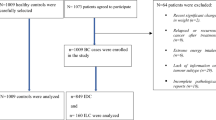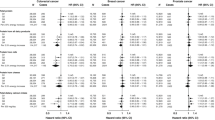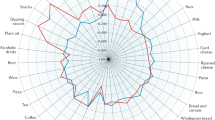Abstract
Objective: To examine evidence that specific fibre-associated macronutrients are associated with a decreased breast cancer risk. To review possible mechanisms, the age group when dietary intervention might be most effective and the choice of a suitable dietary supplement. Design: This review distinguishes specific hormone-metabolic effects of dietary composition from those of body mass and fat distribution, in relation to the age at which they exert major effects on breast cancer risk. Results: Both obesity and a high-fat/low-fibre diet in Western women may be associated with increased estrogen levels which are widely assumed to increase the risk of developing breast cancer. Both obesity and the Western diet are likely to stimulate insulin resistance, leading to increased levels of bioavailable estrogen. The concomitants of hyperinsulinemia may synergize with estrogen in stimulating progression of pre-neoplastic lesions in the breasts of late pre-menopausal women. Increased intake of fibre-associated macronutrients may reduce insulin resistance in addition to reducing the circulating levels of estrogen. Conclusions: The effect of dietary intervention on breast cancer risk in Western women may be tested in pre-menopausal women over the age of 40 y, with evidence of atypical hyperplasia in a breast biopsy. The most suitable fibre-associated macronutrient is still problematical but soy protein constituents have been shown to inhibit the growth of rat mammary cancer models and also of human breast cancer cell lines in the laboratory.
This is a preview of subscription content, access via your institution
Access options
Subscribe to this journal
Receive 12 print issues and online access
$259.00 per year
only $21.58 per issue
Buy this article
- Purchase on Springer Link
- Instant access to full article PDF
Prices may be subject to local taxes which are calculated during checkout
Similar content being viewed by others
Author information
Authors and Affiliations
Rights and permissions
About this article
Cite this article
Stoll, B. Macronutrient supplements may reduce breast cancer risk: how, when and which?. Eur J Clin Nutr 51, 573–577 (1997). https://doi.org/10.1038/sj.ejcn.1600441
Received:
Revised:
Accepted:
Issue Date:
DOI: https://doi.org/10.1038/sj.ejcn.1600441



